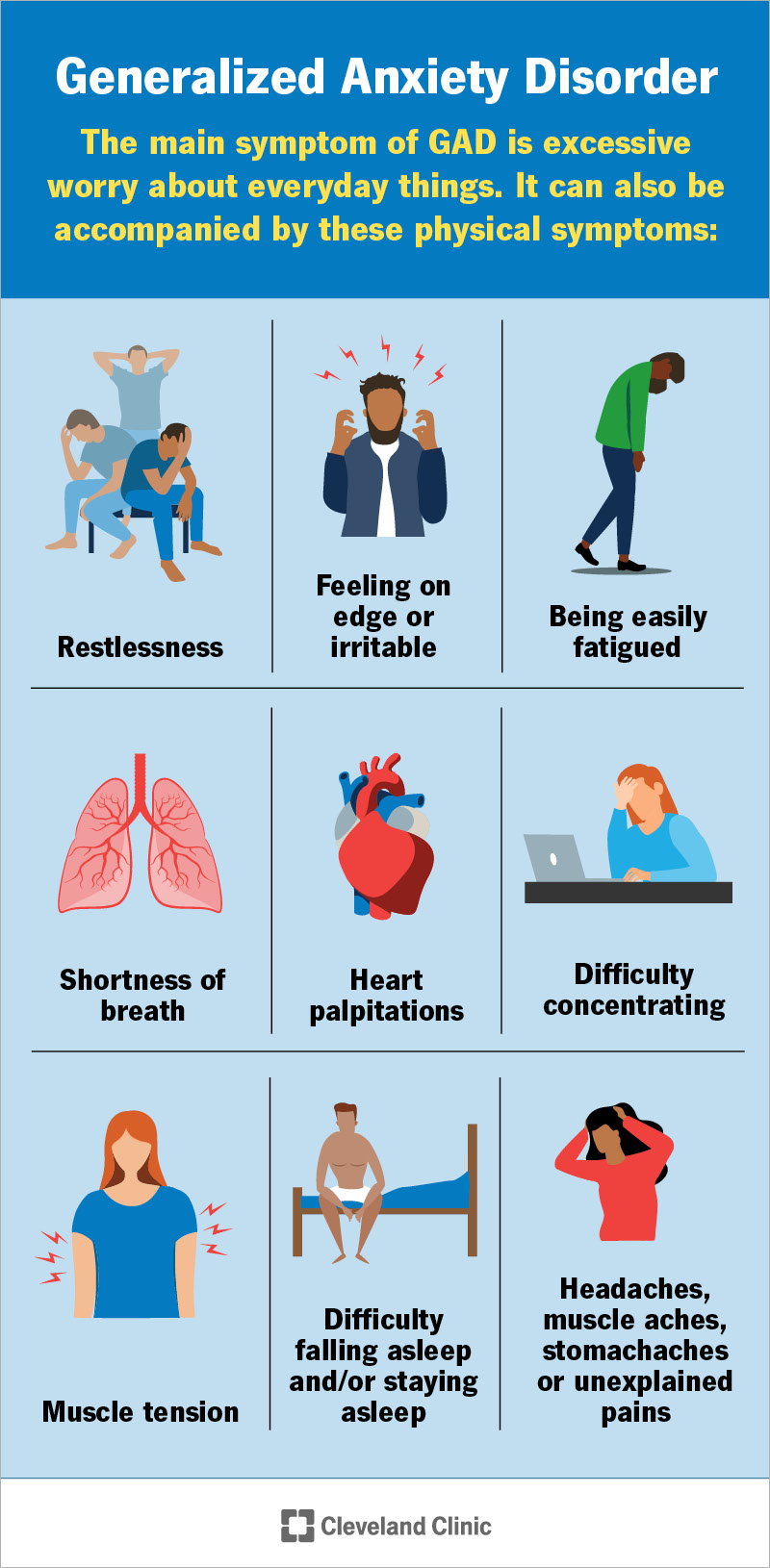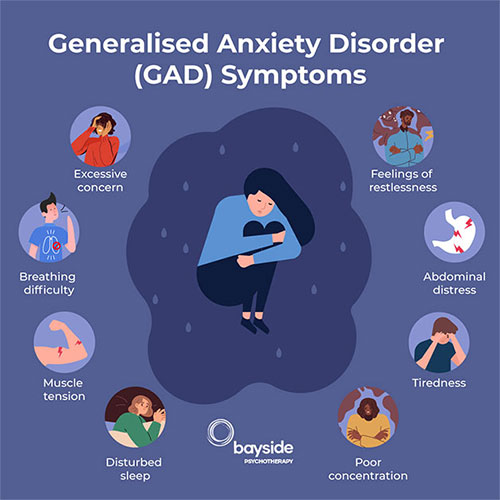Exploring Different Strategies in Counselling for Stress And Anxiety Disorder for Long Lasting Adjustment
When tackling anxiousness disorders, it's vital to check out a variety of therapy methods. Each approach provides unique understandings and tools to aid you handle your signs efficiently. You might locate that combining techniques can generate the very best outcomes. Nevertheless, recognizing the subtleties of these strategies is essential to promoting enduring modification. Suppose the ideal mix could release a new level of psychological health for you?
Recognizing Anxiety Conditions: A Short Introduction
Stress and anxiety conditions, which impact millions of people worldwide, can significantly impact life. You might experience overwhelming feelings of fear or worry that seem irrepressible. These sensations can lead to physical symptoms like a racing heart, sweating, and even lightheadedness. Typical sorts of anxiousness conditions consist of generalised stress and anxiety condition, panic attack, and social stress and anxiety condition. Each has unique signs, yet they all share a tendency to disrupt your regular and relationships.Understanding the origin of your anxiousness is vital. It might originate from genes, brain chemistry, or life experiences. Recognizing your triggers can assist you manage your responses much better. It's important to keep in mind that you're not the only one in this struggle. Many individuals deal with similar obstacles, and looking for assistance is a solid step toward feeling better. By finding out about anxiousness disorders, you're already on the course to understanding and managing your problem much more effectively.
Cognitive-Behavioral Therapy: Testing Negative Idea Patterns

Determining Adverse Thought Triggers
When you experience moments of distress, acknowledging the certain triggers behind your unfavorable thoughts can be vital in taking care of stress and anxiety. Begin by taking note of situations that provoke sensations of fear or worry. Is it a jampacked room, a future target date, or a conversation with particular people? Jot down these instances in a journal. This will aid you determine patterns in your reasoning. Additionally, notification physical experiences that accompany your unfavorable thoughts, like a racing heart or rigidity in your upper body. By identifying these triggers, you obtain understanding into what's sustaining your anxiety. Comprehending these links is the initial step in challenging those thoughts and inevitably restoring control over your emotional actions.

Replacing Thoughts With Positives
Challenging adverse thought patterns is an essential action in changing your state of mind and reducing stress and anxiety. You might usually find yourself caught in cycles of insecurity or catastrophic thinking. Instead of allowing these ideas determine your feelings, practice replacing them with realistic alternatives or positive affirmations. When you think, "I can't manage this," move it to, "I can handle obstacles one action at a time." This simple change can considerably affect your emotion. Frequently determining and responding to these adverse thoughts helps produce a healthier inner dialogue. Remember, it takes time and effort, but regularly practicing this method can bring about lasting modification, encouraging you to encounter anxiousness with renewed confidence and durability
Structure Coping Approaches Together
Changing adverse ideas is only the start of taking care of anxiety properly. To develop lasting adjustment, you need to construct coping approaches that encourage you. Cognitive-Behavioral Treatment (CBT) assists you recognize and test those unhelpful idea patterns. Together, you and your therapist can explore how these thoughts effect your sensations and behaviors.Start by developing functional methods, like journaling or mindfulness exercises, that allow you to face anxiousness head-on. When you face your anxieties gradually, you'll discover to respond differently.

Mindfulness and Acceptance-Based Approaches: Cultivating Present-Moment Understanding
As you browse the intricacies of stress and anxiety, incorporating mindfulness and acceptance-based strategies can considerably enhance your capability to cultivate present-moment awareness. By concentrating on the present moment, you'll locate that you can observe your thoughts and sensations without judgment. This method assists you recognize your stress and anxiety without really feeling overwhelmed by it.Engaging in mindfulness workouts, such as deep breathing, body scans, or guided meditations, allows you to ground on your own in your current experience. Acceptance-based techniques motivate you to accept your feelings as opposed to combat against them. They lose their power over you.Incorporating these practices right into your everyday regimen can transform exactly how you respond to anxiousness when you approve your sensations. You'll establish resilience and find out to browse stressful situations with better ease. Eventually, cultivating present-moment understanding lays the structure for enduring adjustment, encouraging you to lead an extra meeting life.
Direct Exposure Therapy: Confronting Fears Gradually
Exposure treatment assists you confront your anxieties in a gradual method, making it less overwhelming. You'll find out techniques to encounter anxiety-provoking situations action by step, while also developing coping strategies to manage your responses. This strategy encourages you to take control and minimize stress and anxiety in time.
Gradual Exposure Methods
When encountering stress and anxiety, progressively confronting your concerns can be a powerful means to gain back control. This method, referred to as steady direct exposure, entails slowly exposing on your own to the scenarios or items that trigger your anxiety. Begin with less intimidating scenarios and gradually function your way as much as even more tough ones. If you're afraid of public talking, you could begin by speaking in front of a mirror, then proceed to sharing ideas with a buddy, and eventually attend to a small team. Each action aids desensitize you to the anxiety, building your self-confidence with time. Keep in mind, it's necessary to pace on your own and commemorate small triumphes as you move with this procedure, strengthening your capability to manage anxiety efficiently.
Building Coping Strategies
Structure effective coping approaches is essential for taking care of stress and anxiety, specifically as you confront your fears slowly. One effective approach is exposure therapy, where you begin by encountering your worries in a controlled manner. Start with less frightening circumstances and slowly function your way as much as more challenging scenarios. This steady exposure helps desensitize you to stress and anxiety sets off, making them less overwhelming.Incorporate leisure techniques, such as deep breathing or mindfulness, to soothe your mind throughout exposure. Track your progression, commemorating tiny success along the way to increase your confidence. Remember, it's okay to take your time; the goal isn't perfection yet constant renovation. By building these approaches, you'll equip on your own to navigate stress and anxiety and accept life a lot more fully.
Psychodynamic Treatment: Discovering Origin of Stress And Anxiety
Psychodynamic therapy explores the subconscious mind, exposing the root causes of your anxiety - Counseling services for anxiety. By analyzing your ideas, sensations, and past experiences, this method assists you reveal underlying disputes and unsettled concerns that might add to your current stress and anxiety. You'll collaborate with a specialist to check out childhood experiences, connections, and emotional patterns that shape your feedbacks today.As you acquire insight into these much deeper layers of your psyche, you'll start to recognize just how previous events influence your existing behavior. This understanding can lead to catharsis, enabling you to refine emotions you could have suppressed.Through the healing partnership, you can also determine protection mechanisms that may have developed over time, offering a more clear path to alter. Ultimately, psychodynamic therapy equips you with the devices to resolve your anxiousness at its core, promoting lasting makeover in your psychological well-being
Integrative and Alternative Techniques: Incorporating Methods for Greater Effectiveness
Integrating different restorative techniques can improve your trip towards handling anxiousness better. By incorporating aspects from cognitive-behavioral therapy, mindfulness methods, and holistic approaches, you can produce a personalized technique that addresses your one-of-a-kind requirements. You might use cognitive-behavioral methods to challenge unfavorable thought patterns while including mindfulness workouts to ground on your own in the existing moment.Additionally, checking out alternative methods such as yoga or reflection can advertise leisure and reduce stress and anxiety symptoms. This blend enables you to establish better self-awareness and resilience.Experimenting with these varied techniques can aid you find what reverberates most with you. Keep in mind, it's regarding discovering a synergy that works, instead of sticking to a single method. This integrative strategy not just offers instant relief yet also cultivates long-lasting skills for managing stress and anxiety, empowering you to recover control over your life.
The Duty of Assistance Equipments: Structure Resilience Through Link
While it could appear that taking care of anxiousness is a solitary trip, having a solid support group can play an essential duty in your strength. Surrounding on your own with understanding friends, household, or support teams creates a secure area where you can freely share your feelings and experiences. You advise on your own that you're not alone in this struggle.These partnerships supply inspiration and can give functional coping strategies that have actually functioned for others when you attach with others. It's additionally a chance to acquire perspective; friends can aid you see circumstances in a different way, decreasing feelings of isolation.Moreover, psychological assistance cultivates a feeling of belonging, which can substantially ease anxiousness signs. By leaning on your support group, you can build resilience and deal with challenges better. Remember, connecting for help suggests toughness, and it can make all the difference in your trip toward managing stress and anxiety.
Frequently Asked Inquiries
What Are the Usual Symptoms of Stress And Anxiety Problems?
You may experience restlessness, exhaustion, trouble focusing, irritability, muscle mass tension, and sleep disturbances. Physical signs can consist of quick heartbeat, sweating, and shivering. Acknowledging these indications early can help you look for ideal support and treatment.

How Long Does Therapy Normally Last for Stress And Anxiety Problems?
Treatment for anxiousness conditions typically lasts anywhere from a couple of weeks to numerous months. It really relies on your specific needs, development, and the techniques your specialist makes use of to aid you handle your anxiety effectively.
Can Medication Be Made Use Of Alongside Therapy for Anxiousness?
Yes, medicine can absolutely be used alongside treatment for anxiety. Integrating both approaches frequently improves therapy effectiveness, aiding you manage signs and symptoms while checking out underlying concerns with therapy. Always consult your doctor for customized recommendations.
Are There Self-Help Methods for Taking Care Of Stress And Anxiety?
Yes, there are a number of self-help techniques for handling stress and anxiety. You can practice mindfulness, engage in routine exercise, preserve a well balanced diet regimen, develop a regular, and make use of deep breathing methods to help reduce anxiety symptoms effectively.
How Do I Know if I Required Expert Aid for Anxiousness?
You need to take into consideration seeking expert help for anxiety if it disrupts everyday life, causes substantial distress, or if self-help methods aren't working. Count on your instincts; connecting can bring about much better coping skills and assistance. Usual types of anxiousness disorders consist of generalised anxiousness problem, panic condition, website and social anxiousness disorder. When you encounter minutes of distress, recognizing the certain triggers behind your adverse ideas can be essential in managing anxiousness. Replacing negative ideas is just the start of managing anxiety properly. By examining your ideas, feelings, and previous experiences, this technique helps you reveal underlying conflicts and unsettled problems that may add to your present anxiousness. It's also a possibility to obtain viewpoint; buddies can aid you see scenarios differently, lowering sensations of isolation (Counseling services for anxiety).Moreover, psychological assistance cultivates a feeling of belonging, which can greatly alleviate anxiousness signs